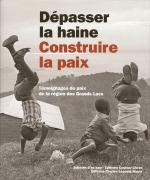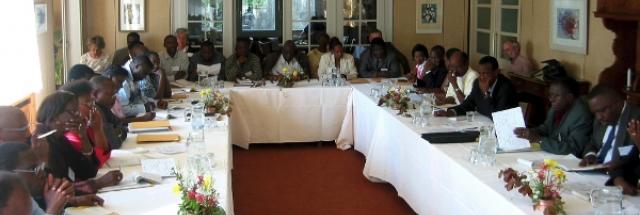Peace-building in Burundi
'Understanding the anguish and rage of the protagonists; managing their emotions in order to bring them back to basics and ensure that the negotiations do not degenerate into a battlefield.' - Thomas Ntambu, project leader -
Since 2000, Initiatives of Change has been working towards peace in the Great Lakes region, in Burundi, the Democratic Republic of Congo and Rwanda. The goal is not to set up negotiations but to prepare minds and to bring people together so that peace agreements can be signed and implemented.
Since 2003, the work has focused on Burundi, at the request of Burundians who feared that their country would slip back into chaos. A long and ongoing process of offering support for the main players in the Burundi conflict was set up. It largely involves bringing them to talk about their wounds and their fears and to establish bonds of trust between them, based on listening to one another and reflecting about their own responsibilities.
Milestones
From 2001 to 2007: numerous missions on the ground in Bujumbura and Tanzania to meet the leaders from all sides, including and in particular the Palipehutu-FNL.
March 2003: round table bringing together representatives from the government, the army, Frodebu, the Catholic Church, the CNDD-FDD, which at that time was a rebel group, and the Palipehutu-FNL. Two CNDD-FDD leaders confided to the organisers that without this round table they would not have managed to assimilate the political process.
June 2003: round table bringing together representatives from the government, the army and the Palipehutu-FNL. Hostilities subsequently restarted, but the meeting was nonetheless an important milestone in changing mindsets and setting up a dialogue.
April 2004: dialogue training given to the Palipehutu-FNL officers during the Kigoma congress.
Spring and summer 2006: the government and the Palipehutu-FNL asked Initiatives of Change to accompany those involved in the Dar es Salaam negotiations, which brought about the cease fire agreements in June and September 2006.
April 2007: ‘honest conversation’ event in Caux, which brought together 33 political, military, religious and media leaders.
May 2007 to July 2008: permanent presence on the ground to support the peace-building process. Permanent contact with all the elements of Burundian political and social life and specific support of the Palipehutu-FNL, the last rebel group, with the goal of reintegrating them into the political institutions. Creation of a network of people committed to working together to normalize political life.
Funding
This programme is currently funded by the Swiss government’s Department of Foreign Affairs.
More Information
More information and news is available on the IofC international website.
 See also Beyond Hate, Building Peace, a new book of experiences of peace-building in the African Great Lakes region (‘Dépasser la haine, construire la paix’).
See also Beyond Hate, Building Peace, a new book of experiences of peace-building in the African Great Lakes region (‘Dépasser la haine, construire la paix’).


